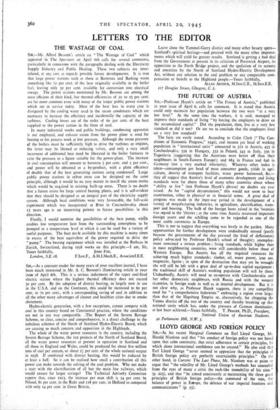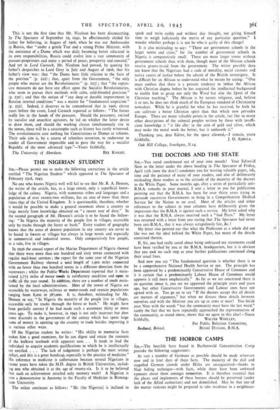LLOYD GEORGE AND FOREIGN POLICY
Snt,—In his recent Marginal Comment on Earl Lloyd George, Mr. Harold Nicolson said that " his conduct of foreign policy was not based upon that calm continuity, that strict adherence to certain principles, by which alone international confidence can be created." He also said that
Earl Lloyd George " never seemed to appreciate that the of British foreign policy are perfectly ascertainable principles." On the other hand, in Curzon: The Last Phase, Mr. Nicolson was at pains to argue that " the volatility of Mr. Lloyd George's methods has concealed from the eyes of many a critic the rock-like immobility of his aims " (p. 223), and that " he aimed consistently at maintaining the three great principles of British foreign policy—the command of the seas, the balance of power in Ettope, the defence of our imperial frontiers and communications '? (P. 55).. This is not the first time that Mr. Nicolson has been disconcerting. In The Spectator of September 19, 1941, he affectionately chided his father for believing, in August of 1906, when he was our Ambassador in Russia, that " under a gentle Tsar and a strong Prime Minister, with the assistance of a Duma which was daily becoming better educated in its own responsibilities, Russia could evolve into a vast community of peasant-proprietors and enjoy a period of peace, prosperity and concord." And yet in Lord Carnock, Mr. Nicolson had proved, by quoting his father's despatches to Lord Grey in July and August of 1906, that his father's view was: that " the Duma bore little relation to the facts of the position" (p. 222) ; that; apart from the Government, "the only people who matter are the Revolutionaries " (p. 223); that "the repres- sive measures do not have any effect upon the Socialist Revolutionaries, who seem to pursue their methods with calm, cold-blooded precision" (p. 230); and that the notion of "any deep or durable improvement in Russian internal conditions " was a matter for " fundamental scepticism" (p. 232). Indeed, it deserves to be remembered that in 1906, eleven years before the event, Lord Carnock reported as follows: "The future really lies in the hands of the peasants. Should the peasantry, excited by socialist and anarchist agitators, be led on whither the latter desire to draw them, and should the working classes simultaneously rise in the towns, there will be a catastrophe such as history has rarely witnessed. The revolutionaries care nothing for Constitutions or Dumas or reforms. Their sole aim is, by a course of relentless terrorism, to endeavour to render all Government impossible and to pave the way for a socialist Republic of the most advanced type."—Yours faithfully,



























 Previous page
Previous page